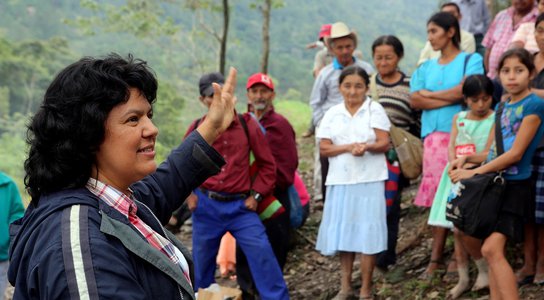Just a year ago, at COP26, internationally renowned environmentalist, Nguy Thi Khanh was part of vital discussions on the transition from coal to renewable energy in Vietnam. Goldman Prize winner Khanh has campaigned for decades for Vietnam to step into a climate leadership role and to commit to an ambitious coal phase out and emissions target. She has also been instrumental to Vietnam installing some of the largest wind and solar power projects in Southeast Asia.
A year later, Khanh sits in prison for the unwarranted charge of tax evasion, in what has been widely condemned as an attempt to criminalise and silence environmental defenders in Vietnam.
Khanh has been imprisoned alongside three other Vietnamese environmental defenders, including Dang Dinh Bach, the country’s top public interest environmental lawyer. Bach was deeply involved in establishing a Domestic Advisory Group composed of independent civil society representatives to monitor the newly negotiated EU-Vietnam Free Trade Agreement, and make concrete recommendations on issues of worker rights, land rights and the environment.
Despite the government’s attempt to silence Khanh, Bach and other environmental defenders serving jail sentences for similar charges, last month Vietnam was elected as a member of the UN Human Rights Council (UNHRC). As a new member of the UNHRC, the Vietnamese government should face increased scrutiny and must be held accountable for criminalisation of environmental defenders. The government's ongoing imprisonment of Khanh Nguy Thi, Dang Dinh Bach and other environmental defenders not only constitutes a violation of human rights, but it also threatens progress on tackling climate change and the United Nations Sustainable Development Agenda.

Environmental activist Nguy Thi Khanh. Credit: Goldman Environmental Prize
At COP27, while Vietnam’s climate leaders are locked up, there may still be discussions around a ‘Just Energy Transition Partnership’ (JET-P) supported by G7 countries, including the United Kingdom, the EU, United States, and Canada, with Vietnam possibly receiving billions of dollars in the process.
Environmental defenders like Khanh and Bach, who have committed their lives to climate justice and a better environment for ordinary Vietnamese citizens, are being forced to give up their freedom because of their calls for transparency and accountability to ensure a truly ‘just’ energy transition in Vietnam. By suppressing debate from climate defenders, Vietnam’s government has set a disturbing precedent for those who speak up or question the government’s climate polices and energy transition work.
Khanh’s invaluable experience will no doubt be missed at this year’s COP. Her collaborative efforts between civil society, industry and the government has helped put Vietnam in the very position it is in to be considered a partner for significant clean energy deals. International donors such as the G7, along with the Vietnamese government must guarantee the ongoing ability of civil society to contribute safely and effectively to climate solutions, without fear of criminalisation.
COP27 presents the ideal opportunity for the G7 to come together and urge Vietnam to show its commitment and responsibility to defending human rights globally and at home, acknowledging the important role that environmental defenders play in implementing climate solutions.
And as a new Human Rights Council member, it is the responsibility of the Vietnamese government to defend human rights. Together with many other NGO’s, Global Witness is calling for the immediate release of Khanh Nguy Thi, Dang Dinh Bach and the other environmental defenders unjustly imprisoned and for any energy transition deals with Vietnam to ensure the ongoing ability of civil society to contribute safely and effectively to climate solutions.

